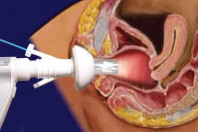 | |
| System | Female reproductive system |
|---|---|
| Subdivisions |
|
| Significant diseases | Gynaecological cancers, infertility, dysmenorrhea |
| Significant tests | Laparoscopy |
| Specialist | Gynaecologist |
Gynaecology or gynecology (see American and British English spelling differences) is the area of medicine that involves the treatment of women's diseases, especially those of the female reproductive organs. It is often paired with the field of obstetrics, which focuses on pregnancy and childbirth, thereby forming the combined area of obstetrics and gynaecology (OB-GYN).
The term comes from Greek and means 'the science of women'.[1][2] Its counterpart is andrology, which deals with medical issues specific to the male reproductive system.[3]
- ^ Porter, Roy (July 1991). "Ornella Moscucci, The science of women: gynaecology and gender in England, 1800–1929, Cambridge History of Medicine, Cambridge University Press, 1990, 8vo, pp. x, 278, illus., £35.00, $49.50". Medical History. 35 (3): 372. doi:10.1017/S0025727300054004.
- ^ McGill, Markus (29 August 2017). "Gynecologists: When to see one, what to expect, common procedures". Medical News Today. Archived from the original on 21 May 2022. Retrieved 23 April 2022.
- ^ Sadri-Ardekani, Hooman; Atala, Anthony (2019). "Regenerative Medicine for the Male Reproductive System". Principles of Regenerative Medicine. pp. 1251–1261. doi:10.1016/B978-0-12-809880-6.00071-0. ISBN 978-0-12-809880-6.